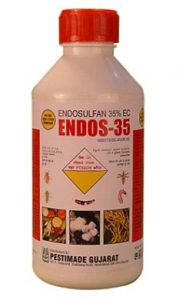What Is Endosulfan?

The Supreme Court has slammed the Kerala government for State’s inaction in providing relief to the Endosulfan pesticide exposure victims.
- This also amounts to a breach of the apex court’s 2017 judgment, which had ordered the State to pay ₹5 lakh each to the victims in three months.
- From the mid-70s, Kerala villages used aerial spraying of endosulfan on 4,600-ha. cashew nut plantation. Locals reportedly experienced illnesses, palsies and deformities.
Endosulfan:
- It is a widely-banned pesticide with hazardous effects on human genetic and endocrine systems.
- It does not occur naturally in the environment.
- It is listed under the Rotterdam Convention on the Prior Informed Consent.
- Use of endosulfan is banned by Stockholm Convention on Persistent Organic Pollutants.
- The Supreme Court in India has banned the manufacture, sale, use, and export of endosulfan throughout the country, citing its harmful health effects in 2011.
Uses:
- Sprayed on crops like cotton, cashew, fruits, tea, paddy, tobacco etc. for control of pests in agriculture such as whiteflies, aphids, beetles, worms etc.
Effects on humans:
- This pesticide is a known carcinogen, neurotoxin and genotoxin (damages DNA).
- Endosulfan blocks the inhibitory receptors of the CNS, disrupts the ionic channels and destroys the integrity of the nerve cells.
Environmental effects:
- Endosulfan in the environment gets accumulated in food chains leading to higher doses causing problems.
- If Endosulfan is released to water, it is expected to absorb to the sediment and may bioconcentrate in aquatic organisms.




